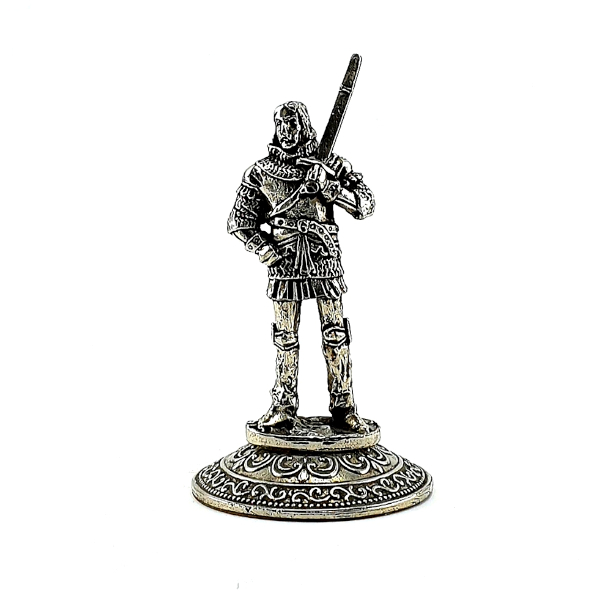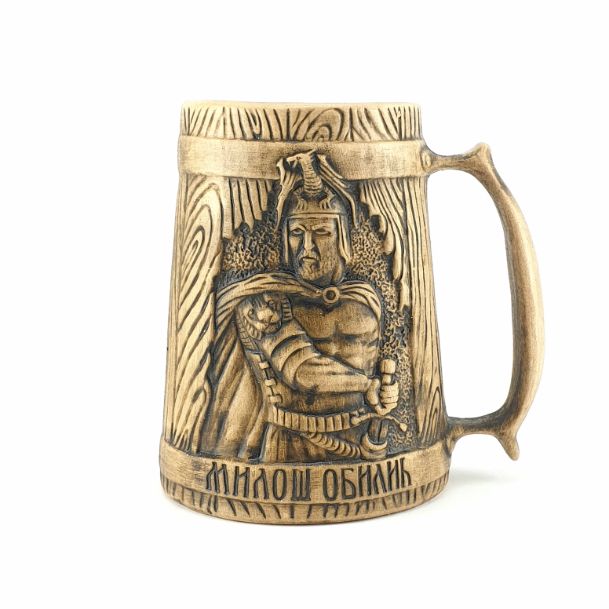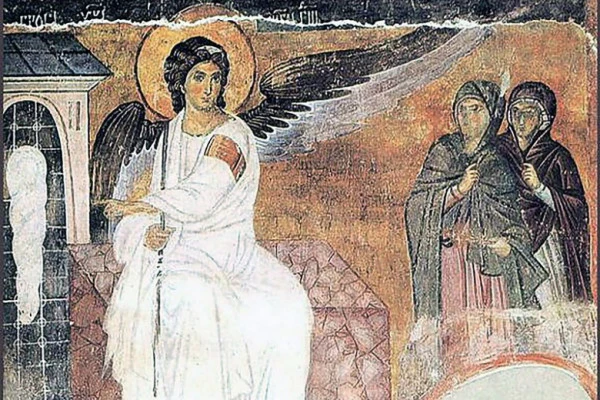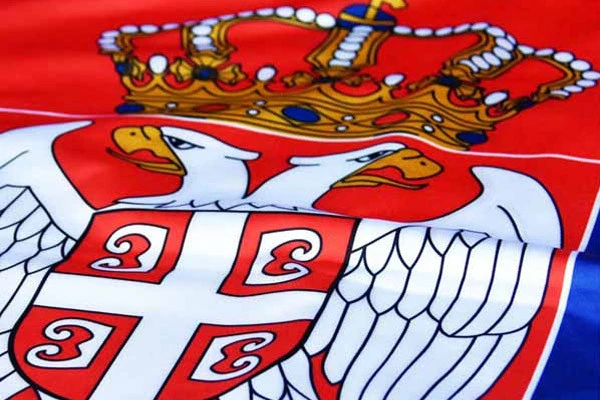Famous ancestors of our region - Milos Obilic
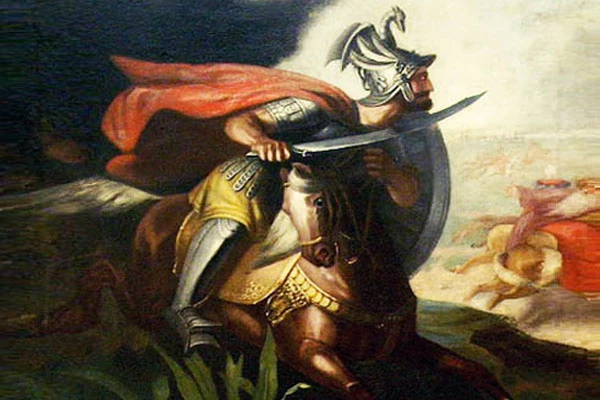
One of the most prominent Serbian epic heroes, about whom numerous legends have been told related to his strength, chivalry and heroism, a character sung in numerous epic songs, is Miloš Obilić.
Little is recorded about the life of Miloš Obilić, while his work remained as a seal on Serbian history and made him famous in such a way that it is still remembered and passed down from generation to generation. Namely, Miloš Obilić, in addition to being an epic hero, also represents a historically important person who largely determined the course of the great battle of Kosovo on Vidovdan, June 28th, 1389.
The heroism of Milos Obilic as a turning point in the battle of Kosovo
With the aim of expanding the Ottoman Empire and further advancing towards Europe, Kosovo, as an integral part of Serbian territory, was a strategic place that further determined the advance of the Ottomans. The Serbian army suffered numerous losses in the defense of its territories and tried to stop further conquests of the Ottoman army. In the struggle for the maintenance of the territory, a Serbian soldier resolutely opposed the very top of the Ottoman army, killing Sultan Murat himself, for whose head he "paid" with his own head.
According to the legend, Milos slipped out of his camp before dawn, went to the enemy camp with the goal of convincing the Turkish guards that he had fled to their side. The guards took him to the Turkish Sultan Murat, and Miloš killed him mercilessly with a knife shortly afterwards.
Miloš Obilić, in his epic works, inscribes himself as a hero above heroes. A soldier of unreal strength and will, of pure chivalry and heroism, is a reflection of the moral victory of the Serbs, which will serve as an inspiration and motivation for future generations for each subsequent struggle.
Strength and heroism of Miloš Obilić
The entire cycle of epic songs and legends formed around the character and work of Miloš Obilić, created a cult and almost unreal character of strength and heroism. According to legend, Miloš was raised by forest fairies and his father was a dragon himself, around which a special cult called "Order of the Dragon" was created.
There are also many songs in which Milos belongs to the closest circle of subjects of Prince Lazar. The people gathered at the prince's feast the night before the Kosovo battle express doubts about Miloš's loyalty to Prince Lazar. Humiliated and insulted, Milos decides to kill the sultan in order to prove his loyalty. All these beliefs arose in order to increase the courage and power of Miloš Obilić.
Memory of Milos Obilic
After the assassination of the Turkish sultan, Milos Obilic became one of the most respected heroes in the Serbian people. This is supported by many works of art made with the aim of preserving the memory of him.
After Gorski vijenac, Miloš Obilić actually became a symbol of heroism. Combining what the legend and the folk song knew about him, Njegos put Milos in the very center of the Kosovo war. The legend of the evening before the battle, the story of betrayal and Milos's heroism, Branković, Prince Lazar, Milos's three brothers, all this was summed up in 1847 and united by the inspiration of Njegos.
During the period of the First Serbian Uprising, a fresco of this hero was made in the Hilandar monastery.
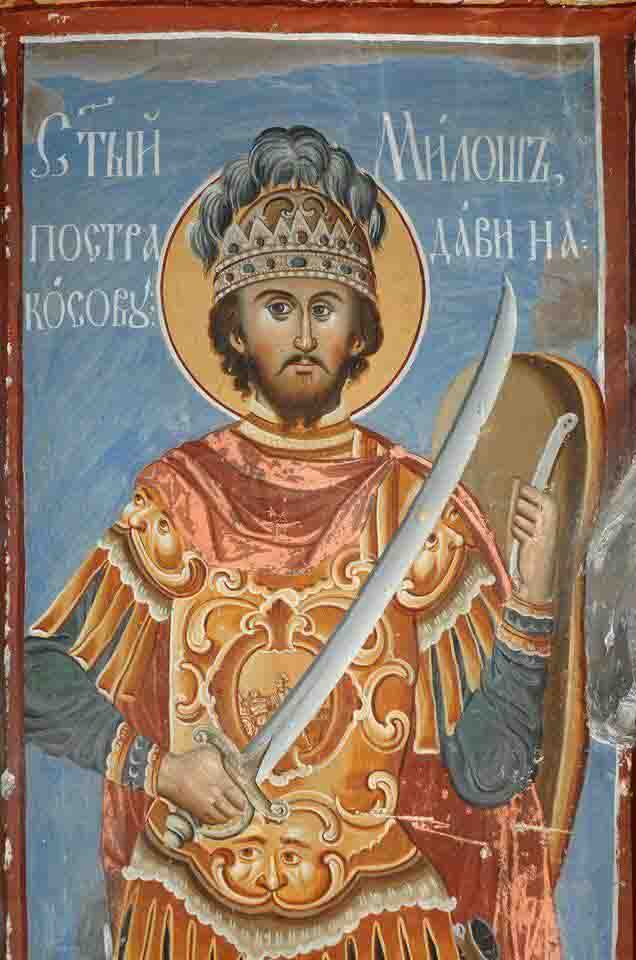
The grave of Miloš Obilić - unknown or secret?
The exact location of Miloš Obilić's grave is unknown. One of the first writings about the place of Miloš Obilić's grave comes from the pen of one of the first researchers of Serbian medieval history, who says that Miloš's grave is located in a church on the field of Kosovo.
That there was indeed a medieval church on the field of Kosovo was confirmed in 1935, when excavations were carried out at a place that the Albanians themselves called Kisha Milloshit or Miloš's Church.
However, one of the possible places is often mentioned as the Ravanica monastery. The reason for that is the folklore according to which Prince Lazar Hrebljanović built the monastery, at the suggestion of Miloš Obilić himself. The inspiration for this information comes from the song "Zidanje Ravanice".
All this is an introduction to the discovery of a mysterious grave in Ravanica in the late 1950s. According to the records preserved by archaeologists, not far from the place where Lazar's sarcophagus was originally located, the grave of an unknown Serbian great man was found. In addition to some of the remains, military equipment and two coins from that time were found in it. The position of the tomb in relation to the prince's sarcophagus coincides with the legend in which it is said that Miloš was buried under the prince's feet.
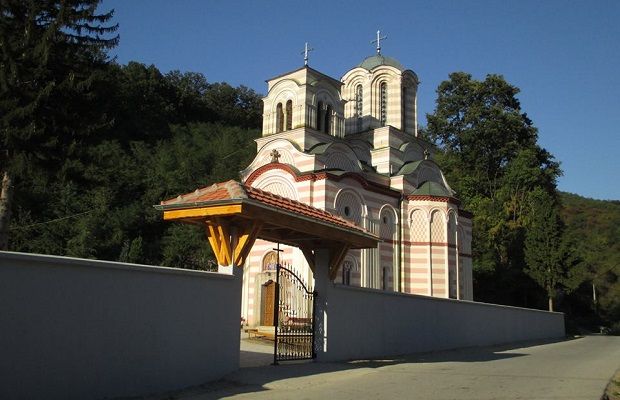
Tumane Monastery is mentioned as another potential location of Miloš's grave. Namely, according to the legend, Miloš (K) Obilić was born in the village of Kobilje near Golubac. The story goes on to say that as a hunter, he once wounded a hermit, who lived in a nearby cave. The wound was so severe, and seeing that the last hour was approaching, the hermit uttered the words: "Tu mani."
Broken by a guilty conscience, according to tradition, Milos decided to build a monastery on the site of the monk's suffering, which is popularly called Tumane. The beginning of the fighting in Kosovo prevented Milos from waiting for the end of the construction of the endowment.
When, according to the record, the priest of the Tuman monastery visited the monastery in the early 1900s, a mysterious tomb with well-preserved relics was found in the immediate vicinity of the hermit's grave.
Certainly, the exact location of Miloš Obilić's grave remains an open question to this day.
Related products
Read also
How to wash a pirot carpet - 5 steps to a perfectly clean and fragrant carpet
Traditional Serbian carpets are a valuable family heirloom. They refine and…
White angel - the purest symbol of the Serbian people
Frescoes represent an artistic segment of religion and as such occupy a special…
Serbian flags throughout history - What all Serbian flags looked like and what distinguishes them
A flag is much more than a piece of cloth – it is a symbol of a nation's identity,…
Who was Saint Sava and what was his contribution?
"Saint Sava: A Beloved Serbian Saint with a Rich Legacy and Cultural Significance"
…Serbian New Year: Tradition, Customs and How to Celebrate it
The Serbian New Year, also known as the Orthodox New Year, is celebrated on…
Gifts Inspired by Serbian Culture: Authentic Ideas for the Holidays
The holidays are a time of giving, and finding the perfect gift is often a challenge.…
Traditional Serbian Christmas Customs: How to Cultivate Them in Modern Times?
Christmas is the most joyous holiday in Orthodox Christianity, a time when families…
How to Bring the Spirit of Orthodox Tradition into Your Home This Winter?
Winter is the perfect time to bring warmth, togetherness and the spirit of Orthodox…
Serbian Souvenirs: Perfect New Year's Gifts for All Tastes
New Year is the time of giving, and what is more beautiful than a gift that…
How to stay productive and not waste an entire day on Black Friday shopping
Black Friday is a day full of amazing discounts, but it can easily become exhausting…
Folk Beliefs and Customs for Saint Aranđel - Assembly of Holy Angels
Saint Michael the Archangel, who is celebrated…
Folk Beliefs and Customs for Đurđić - Glory of St. George
Đurđić, the feast of St. George, celebrated on November 16, is one of the most…

Apply for newsletter
Sign up for the Serbianshop newsletter and get a 10% discount.


